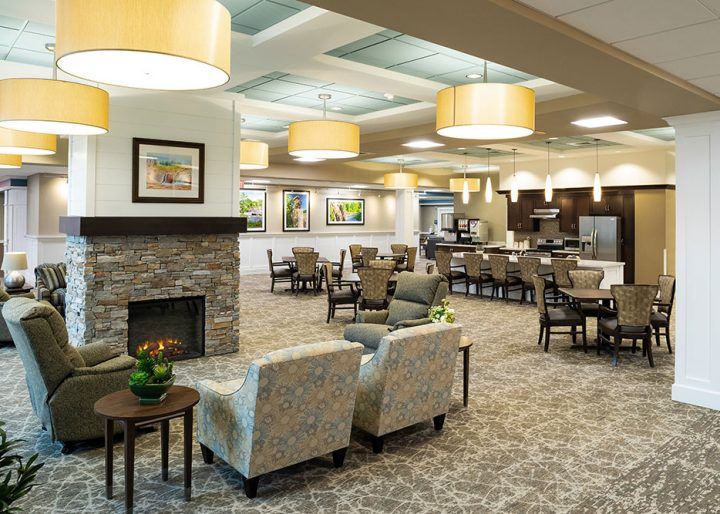Find senior-friendly Assisted Living facilities for seniors who love animals.
Find senior-friendly Assisted Living facilities for seniors who love animals.
Blog Article
Exactly How Aided Living Facilities Enhance Top Quality of Life for Those With Dementia
Aided living facilities play a crucial function in boosting the lifestyle for people with dementia by applying customized treatment strategies that provide to their unique demands. These settings integrate structured activities with psychological support, cultivating a feeling of neighborhood while guaranteeing safety and security and self-reliance. The assimilation of interesting programs and family members involvement even more improves the homeowners' experience. The intricacies of mental deterioration treatment proceed to advance, triggering a more detailed exam of exactly how these facilities adapt and innovate to satisfy the challenges dealt with by residents and their families. What effects does this have for future treatment versions?
Personalized Care Program
(Dementia Care Charlotte)Oftentimes, individuals with dementia need tailored support that addresses their special demands and preferences. Personalized care plans are crucial in assisted living settings, as they make sure that each resident receives appropriate attention and services. These strategies are created collaboratively, entailing medical care specialists, caretakers, and household participants to produce a detailed introduction of the individual's case history, cognitive abilities, and personal passions.
A well-structured personalized care strategy commonly consists of certain objectives associated to health and wellness management, daily activities, and social engagement. It makes up the person's cognitive decrease while advertising independence and self-respect. Normal analyses and updates to the care strategy are crucial, as they enable modifications based on the local's progressing problem and preferences.
Key elements of these plans often entail medicine administration, behavioral assistance methods, and nutritional standards tailored to the individual's requirements (Assisted Living). By concentrating on individualized care, assisted living facilities can cultivate a supportive setting that improves the quality of life for people with dementia, inevitably adding to their overall wellness and happiness. This individualized strategy respects the individuality of each local, guaranteeing they get the compassionate care they require

Engaging Tasks and Programs
Engaging citizens in meaningful activities and programs is crucial for improving the quality of life for people with dementia. These tasks not just provide pleasure yet likewise boost cognitive feature and promote social communication, which can mitigate feelings of seclusion often experienced by locals.

Additionally, customized programs are crucial in making sure that each homeowner's one-of-a-kind choices and capacities are recognized. This customized strategy urges engagement, improves self-worth, and supplies a sense of achievement.
Additionally, routine evaluations of citizens' rate of interests can assist personnel customize and adapt activities to far better match advancing requirements. By prioritizing engaging activities and programs, aided living centers can dramatically enhance the general experience and emotional health and wellness of individuals living with mental deterioration.
Safe and Helpful Environment
Producing a safe and encouraging atmosphere is vital for individuals with mental deterioration, as it straight impacts their health and lifestyle. Helped living facilities are made with certain attributes that advertise safety and security while promoting a sense of safety and convenience. These environments prioritize ease of access, with formats that reduce confusion and urge self-reliance, enabling citizens to browse their environments extra quickly.
Security procedures, such as safe entryways and exits, stop straying and unapproved accessibility, which are important considerations for individuals with mental deterioration (Assisted Living). Team members are educated to identify the distinct demands of locals, giving customized assistance and supervision to guarantee their safety. Moreover, the incorporation of soothing shades and familiar items can help in reducing stress and anxiety and disorientation, creating a much more soothing atmosphere.
Along with physical safety and security, psychological support is vital. Facilities usually employ staff who are not just experienced in caregiving however likewise learnt compassion and interaction, cultivating count on and rapport with locals. This holistic strategy adds to a nurturing environment where people feel valued and comprehended, eventually boosting their general high quality of life.
Social Communication and Area
An encouraging setting not only prioritizes safety but additionally fosters opportunities for social communication and community engagement, which are crucial for individuals with mental deterioration. In assisted living facilities, organized tasks and public rooms motivate locals to attach with each other, minimizing sensations of isolation usually experienced by those with cognitive problems.
Social interaction plays a considerable function in enhancing emotional well-being and cognitive function (Assisted Living). Engaging with peers in team tasks such as games, arts and crafts, or exercise not only stimulates cognitive abilities however additionally nurtures a feeling of belonging. Facilities typically arrange events that advertise socializing, enabling citizens to construct connections and share experiences, which can be especially valuable for those with mental deterioration
In addition, a vibrant neighborhood atmosphere can boost the overall high quality of life for locals. Team participants are trained to help with communications and assistance homeowners in developing significant links.
Family Members Participation and Assistance
Household participation is crucial in sustaining individuals with mental deterioration in assisted living environments. Actively involving family members not just provides emotional convenience to residents however additionally fosters a sense of belonging and connection in their lives. When families join treatment preparation and daily activities, they add beneficial insights regarding the person's choices, history, and needs, which can boost personalized care.
Additionally, normal family check outs can dramatically improve the emotional health of residents, decreasing feelings of isolation and anxiousness. Member of the family can additionally aid in maintaining cognitive feature by engaging their liked ones in familiar discussions and activities. This interaction strengthens personal identity and assists locals really feel valued and recognized.

Conclusion
Finally, aided living centers dramatically boost the top quality of life for people with dementia through personalized treatment strategies, engaging tasks, and a risk-free environment. These components foster cognitive excitement, emotional well-being, and a feeling of independence. Routine social communications and solid household involvement add to significant connections and psychological support. Jointly, these aspects create a holistic strategy to care that addresses the distinct needs of people with mental deterioration, promoting overall health and dignity.
Report this page